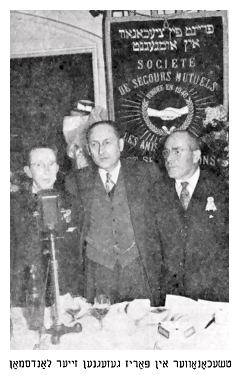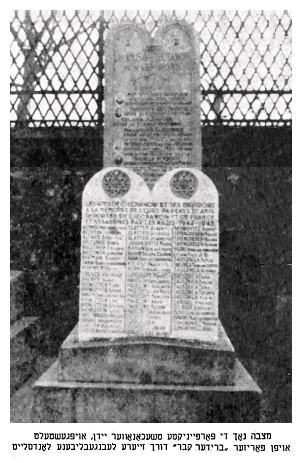
F. Tanenbaum, upon his departure for Israel
|
[Page 508]
After World War I, when Poland became independent, the situation in all Polish cities and shtetlech, in spite of all expectations, grew much worse. The economic anti-Semitism robbed the Jews of their livelihood. The young people had no future to look forward to. The hooligan attacks on Jews also increased. Naturally, Ciechanow was no exception and Jews, particularly the young, left the shtetl and emigrated. They left for America, Eretz Yisroel, and especially for nearby France.
In France as well, the life of the new immigrants was not easy. They had to seek employment, go to various government offices to get work-permits. Many of them had material difficulties. More than one had to sometimes spend the night on a park bench. In these circumstances, the idea arose amongst the newcomers to form a landsmanshaft to offer mutual assistance to one another as much as possible.
In the beginning of 1928, therefore, the first “Fraternity of Ciechanowers And Nearby Shtetlech” was formed. The included shtetlech were Plotsk, Proshnitz, Mlawa, Noshelsk and others. The main purpose was mutual assistance for local Ciechanowers as well as help for those who were suffering in Polish prisons for various political ideas.
The Ciechanow “Fraternity” carried on very useful activities for eleven years, up to the time of the outbreak of World War II in 1939. At that time the number of Ciechanowers in Paris was around seventy families.
The terrible war also brought great tzores for the Jewish population in France. The brutal acts of the Hitlerite murderers were not strange to us, though we were in France then. As foreigners nearly all Jewish men volunteered for the French army to fight against humanity's enemy, against Hitler and fascism.
Exactly one year later, when France capitulated, before the German attack on the Soviet Union, the first racial laws against Jews began. After the arrest of the first five thousand Jews, a great portion of the Jewish
[Page 509]
population began to flee to the so-called “free zone” (south zone), where the Vichy government ruled, in order not to fall into German claws.
But it didn't take long and all of France was occupied by the Germans, and with this began the German extermination of the Jews of France. Jews were arrested en masse. Various lagers were established by the Germans and to these were sent men, women and children, and from there to Auschwitz.
The resistance against the Germans grew stronger. Jews, together with large numbers of French, fought against the occupiers. Aid committees were also established to help Jews with false “Aryan” papers, with a hiding place. In this resistance movement our landsleit also participated.
Shlomo Zalman Kahane, in spite of his poor health, took an active part in the resistance against the Germans right to the end.
We paid with two young lives of our Ciechanowers. These were the two heroes who were shot by the Hitler brutes, namely: Shimon Bronstein (a son of Laibish Bronstein) and Bernard Coopershmid. They perished aged 20 and 21.
The joyous days arrived when the Allied forces, together with the resistance fighters, gave the death-blow to the Germans. Our hearts started to beat harder. We waited with bated breath, thinking that at any moment our dear ones would return, parents will find their children, children – their parents, but unfortunately a terrible picture unfolded for us.
Only a handful returned. We suffered horribly by this and thought it was the end of the world. But the will to live is stronger than everything With an iron will we started to reconstruct our destroyed homes. Slowly the few remnants, survivors of the lagers, started to return. Jews who had survived in Soviet Russia came to France. They told us the tragic news of our destroyed homes. The survivors who returned from the Soviet Union to Ciechanow and the surrounding shtetlech did not find anyone in the Poland they had left. Their first place of destination was France -- Paris.
For us, the very few survivors who still lived here, every new returnee, Chiechanow landsman, was a real treasure, a brother with whom we rejoiced. We helped and did everything in order to give him the first primary aid.
A new problem arose. We organized all our forces, though we ourselves were shattered from our experiences that we had suffered through in France. So, with the help of the Parisian Yiddish newspaper we gathered all the Ciechanower survivors and formed the landsmanshaft with the name: “Friends of Ciechanow and Surroundings,” whose first undertaking was: to give the necessary primary aid to those who had come from various lagers.
The first meeting of the newly-formed landsmanshaft took place September 28, 1946. All surviving Ciechanowers were present, as well as survivors from the surrounding shtetlech: Mlawa, Proshnitz, Makow, Schegova and Plonsk. After a very serious exchange of ideas, a committee of the following was elected: President - Yosl Mlotzker; vice-president - Henekh Perlmutter; secretary - Laibl Rosenblum; treasurer - Yitzhak Leib Kleinetz; auditors: Moishe Weinstock, Frau Faige Asherman (Sadiker) and Traister. The first objective of ours was to help establish, even though temporarily perhaps, the new arrivals, to provide them with legal papers and work permits. All this was connected with great difficulties. We had to pay for hotel rooms, where the survivors lived temporarily.
The committee formed: a commission to help the sick -- whose task it was to visit a sick member -- and a loan fund that issued loans without interest.
With the establishment of the State of Israel we, like other
[Page 511]
Jewish organizations and “societies,” participated in the great fund-raising for the Haganah, and at various opportunities collected food and other items for our brothers in Israel.
Frequent banquets and farewell evenings were arranged for the Ciechanower who volunteered in Paris to fight for the independence of Israel.
At all undertakings related to helping Israel we take an active part. We did this, for example, by buying a sum of loan certificates.
 |
| F. Tanenbaum, upon his departure for Israel |
|
|
[Page 512]
We also purchased 260 trees to plant in the Martyrs' Forest in memory of the Ciechanow Jews who perished.
*
The landsmanshaft also concerned itself with the Ciechanowers in France who pass away. A Jewish cemetery was established, for which the living are responsible. The problem of grave sites is a difficult one, particularly in a world-city such as Paris. For the last 50 years no separate graves are allowed in Paris. The dead, who while alive did not have the possibility of belonging to an organization that has a cemetery, get buried for only 5 years. After this the remaining bones get burnt. As a result, it is a very serious problem without a Jewish cemetery that is called a Brider Kever (Brother Grave),
We have engraved on the monument the names of those who perished and every year the memorial service takes place where we mention as well those who died in Paris.
*
Y. Mlotzker
 |
 |
| erected in the Parisian “Brother Grave” by their surviving landsleit |
|
|
|
JewishGen, Inc. makes no representations regarding the accuracy of
the translation. The reader may wish to refer to the original material
for verification.
JewishGen is not responsible for inaccuracies or omissions in the original work and cannot rewrite or edit the text to correct inaccuracies and/or omissions.
Our mission is to produce a translation of the original work and we cannot verify the accuracy of statements or alter facts cited.
 Ciechanow,
Poland
Ciechanow,
Poland  Yizkor Book Project
Yizkor Book Project
 JewishGen Home Page
JewishGen Home Page
Copyright © 1999-2026 by JewishGen, Inc.
Updated 8 July 2003 by LA